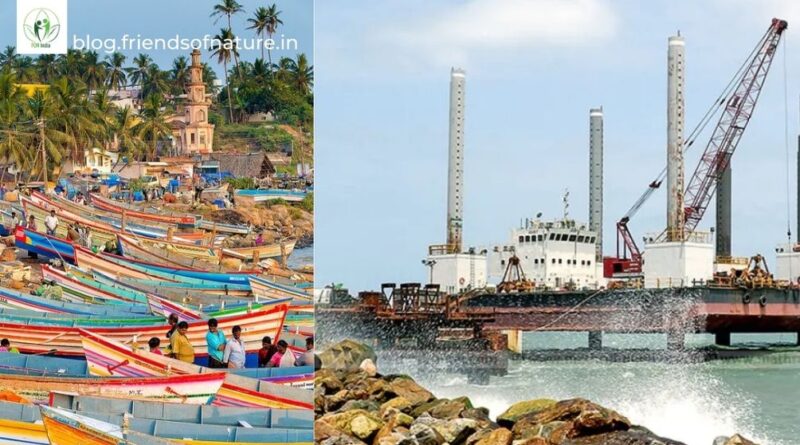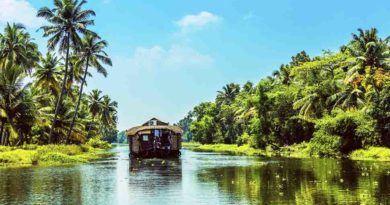Vizhinjam port turning into an eco disaster
Steni Simon | Express News Service
The construction of the Vizhinjam International Deepwater Multipurpose Seaport is fast progressing. With that, the tragedy awaiting the coastline is also fast approaching, say researchers. The continuous dredging activities in the Vizhinjam region have led to environmental problems and the rocky reefs which are a habitat for hundreds of marine creatures have been covered with sand and are completely destroyed. This has also led to the loss of livelihood of the fishermen community, especially traditional mussel collectors.

Dredging for the sea lane began in 2015 after Vizhinjam International Seaport Limited (VISL) signed a contract with Adani Vizhinjam Port Private Limited for the Rs 7,525-crore project. Due to the nature of the land and rock groups, it is said the area is landslide proof and that negates the need for permanent dredging, thereby making Vizhinjam an ideal location for the construction of a port. However, the experts who have been researching the marine ecology in the area point out that the port construction is not only causing permanent damage to the sea ecosystem but also affecting the marine life and the livelihoods of fishermen.
Several studies carried out by volunteers of the city-based Friends of Marine Life (FML) led by chief coordinator Robert Panippilla have found that several of the rocky reefs have already been destroyed due to the dredging activities and other remaining ones are on the verge of destruction. Experts say that as the oceans absorb the gases that cause global warming, they become more acidic, leading to the loss of marine biodiversity such as the destruction of marine habitats and liquefaction of the coral reefs.
Kumar Sahayaraju, a marine biologist involved in documentation of the reefs, says, “Rocky reefs such as ‘Kozhippara Paru’, ‘Madan Paru’, ‘Panavilakode Kallu’, ‘Parayan Kallu’, ‘Neruv Kallu’, ‘Kulathukal Paru’ and ‘Charupara Kallu’ have already been destroyed due to dredging and more than 147 species including mussels and corals have been lost. A 2017 study by the Thiruvananthapuram-based Friends of Marine Life found that such coral reefs are also beginning to be destroyed in the seas off the Inayam region of Kanyakumari.”
Kumar says, “Climate change is generally said not to affect the deep sea. However, deep-sea biodiversity largely adapts to stable temperature conditions. Therefore, when the temperature changes due to climate change, the deep-sea biodiversity will no longer be able to adapt to it. The monsoon season is crucial for fishermen and the sea. This is also the time of fish breeding. The currents in the ocean in monsoon contribute to the phenomenon of ‘Karaneerilakkam or upwelling which contributes to marine biodiversity. However, the fishermen say there was no strong monsoon or Karaneerilakkam after Cyclone Ockhi.”

The ocean expert, who works closely with the fishermen community, said the traditional fishermen have tabulated that a few types of fishes such as Chennavara (Red mullets), Numb fish, and Torpedo Ray found in the rocky reefs of the coastal regions of the district have completely disappeared. Kumar says, “I recently documented 32 traditional fishing reefs on the south Thiruvananthapuram coast from the shipping channel and entrance of the proposed Vizhinjam port. These are under threat. I noticed that the sessile corals which provide a habitat for the fishes are getting bleached and degraded, resulting in depletion of fishes.”
A Biju Kumar, head of the Department of Aquatic Biology and Fisheries, University of Kerala, said, “The region had a good mussel bed before the dredging works began. However, after the dredging began, we noticed that most of it were covered by sand. If this continues, it will lead to the total destruction of the mussel habitat.”
The fishermen also blame the port project for destroying the mussel habitat and their livelihood. Sam Kutty, a member of the Fish Workers Forum, Kovalam unit, says, “The marine biodiversity has been completely destroyed due to the Vizhinjam port dredging. The mussel habitat is destroyed and due to less mussel catch, the mussel collectors are forced to take up other jobs to survive. If dredging continues, the sea ecosystem will be completely destroyed in a few years.”

The dark side of development
Kumar Sahayaraju, a marine biologist involved in the documentation of the reefs, says many rocky reefs have already been destroyed due to dredging and more than 147 species including mussels and corals have been lost
Port construction is causing permanent damage to the sea ecosystem and destroying marine life and livelihoods of fishermen, say experts. Coral reefs and mussel habitats are being destroyed. Several fish species have disappeared already




